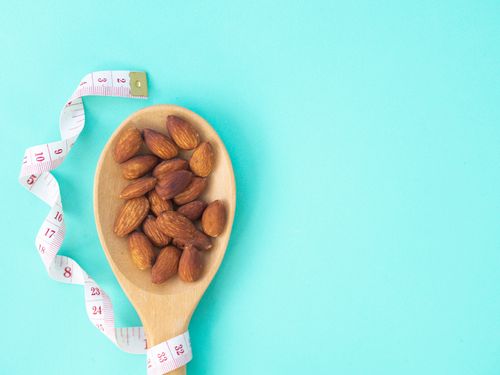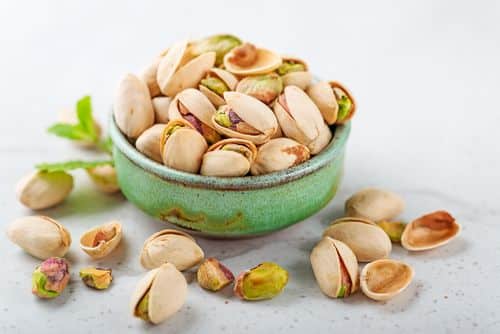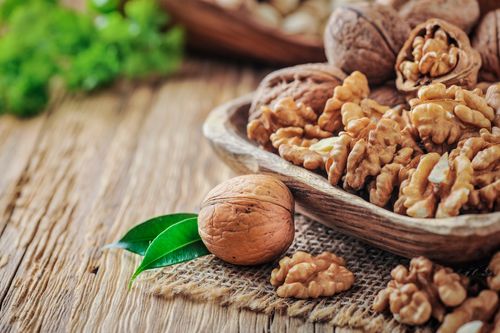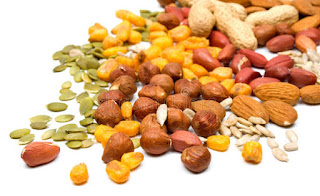6 Benefits of Adding Nuts to Your Diet
This article will highlight ten healthy nuts to look out for next time you are in the grocery store and their nutritional profiles. In addition, it will also detail four incredible benefits of consuming nuts and specify three nuts that may contribute to weight loss.
10 Nuts that are Good for your Health and their Nutritional Values
Adding nuts to your diet doesn’t have to be complicated. They can be eaten alone as a snack or can be added to an array of dishes. The following ten nuts can bring about significant benefits to your health and wellness. As you will notice, not all nuts are the same; some contain more calories and different macronutrient ratios (carbs,protein & fat) than others.
Benefits of Consuming Nuts
By adding nuts to your diet, a number of significant changes to health can occur. This section will highlight a number of benefits associated with consuming nuts regularly.
1) Consuming Healthy Fats
Nuts contain high amounts of good fats. Many believe that consuming a large amount of fat has a negative impact on the body and can increase the risk of developing chronic diseases. However, the understanding that fats are bad for you is obsolete.
It’s important to recognize that there are four different types of dietary fat-saturated, monounsaturated, polyunsaturated, and trans fats. Trans fat is found in processed food items and is detrimental to health. However, the other three types of fat are perfectly safe for consumption. Nuts are especially high in monounsaturated and polyunsaturated fats which are fats that have been linked with a number of health benefits.
These “good” fats provided the body with energy, allow for the absorption of key vitamins and minerals, maintain immune and nervous system function, insulate the body, and regulate blood pressure and clotting. Also, nuts are an excellent source of omega 3 and 6 and therefore, consuming nuts regularly can ensure that the body functions optimally.
2) Consuming Nuts Improve Heart Health

Both monounsaturated and polyunsaturated fats appear to have a substantial impact on heart health by reducing cholesterol levels. In a similar way to fats, cholesterol has been demonized over the past number of years as is often seen as the cause of a number of heart-related conditions. It is true that having a high level of cholesterol may increase your risk, however, this is dependent on the type of cholesterol.
There are two types of cholesterol, low-density lipoproteins (or LDL’s) and high-density lipoproteins (or HDL’s). Having an elevated level of LDL’s in the blood can cause plaque to build-up within the artery walls and increase the risk of cardiac-related diseases. However, having a high level of HDL’s in the blood is no cause for concern and can actually reduce the risk.
Triglycerides are a type of fat found in the blood and having a high triglyceride level can increase the risk of developing heart-related diseases and problems in a similar way to LDL’s. In addition, a high triglyceride level may also lead to high blood pressure, elevated blood glucose levels, and obesity. Extremely high levels can even begin to interfere with the liver and pancreas. Studies have shown that by regularly consuming nuts, it may be possible to reduce triglyceride levels thus reducing the risk of developing chronic illnesses.
3) Facilitates Weight Loss

Despite being high in fat and calories, nuts are incredibly healthy. Regularly eating nuts as part of a healthy diet is not associated with weight gain, and may even help you lose weight. Nuts are high in unsaturated fats, which, according to some studies, increase the oxidation of fats and thermogenesis, helping turn calories into energy at a faster rate. Also, nuts are high in fiber, which can increase the feeling of satiety and delay stomach emptying, thus suppressing hunger and making the person feel fuller for longer.
4) Nuts Contain a wide range of micronutrient
Micronutrients are simply vitamins and minerals that the body needs to regulate and maintain bodily function. An array of nutrients are required in order to produce energy and bring about nerve impulses and muscular contractions. Furthermore, micronutrients are needed for maintaining organ, bone, and immune health and function. Nuts contain a vast range of micronutrients including substances such as vitamin E, calcium, magnesium, iron, copper, folate, phosphorus, potassium, and zinc. Therefore, consuming nuts often can significantly contribute to maintaining good health and function.
5. Rich in Antioxidants
Antioxidants are compounds that prevent damage from occurring at a cellular level. By ensuring that you consume a large number of antioxidants, you can boost your immune system and reduce the risk of developing illnesses such as cardiovascular disease, diabetes, Parkinsons’, Alzheimers, and cancer. Several nuts, such as walnuts, pecans, and chestnuts, contain an extremely vast number of antioxidants and may, therefore, be useful in preventing a number of these diseases.
6. High in Fiber Contents
Fiber is a type of non-digestible carbohydrate that can be found in high quantities in plant-based foods – including nuts. Fiber is essential for digestion and therefore, it is important that you consume a diet that is high in fiber. Failure to consume an adequate amount of fiber may lead to a range of digestive issues such as constipation, irritable bowel syndrome (IBS), and diverticulitis.
Along with aiding digestion, fiber also plays a key role in stabilizing glucose and cholesterol levels. Therefore consuming fiber is especially important for those who suffer from diabetes and high cholesterol. In addition, consuming a high amount of fiber has been found to benefit the heart. A number of studies that have investigated high-fiber diets have indicated that fiber may reduce the risk of developing chronic diseases such as coronary heart disease, strokes, diabetes, and cancer.
It can be concluded that by consuming nuts regularly, you can increase the amount of fiber that you consume each day thus consequently improving your digestive health and reducing the risk of illness.
3 Best Nuts For Weight Loss
As stated earlier, for weight loss to occur, calories need to be restricted, yet, a number of studies that have indicated that a selection of nuts may accelerate the weight loss process.
This section will review the specific weight loss benefits associated with almonds, pistachios, and walnuts.
1) Almonds

There have been many studies conducted on the consumption of almondrs and weight loss. Consistently, results have indicated that the nut helps to promote weight loss. One particular study looking at overweight females found that those who ate almonds lost three times the amount of weight and dropped waist sizes more quickly when compared to those who didn’t.
2) Pistachios

Pistachios have also been documented to bring about positive changes in body weight too. One study not only indicated that pistachios can contribute to weight loss, but it is also found that it brought about a decrease in triglyceride levels.
Along with hazelnuts, almonds and pistachios contain the highest amounts of protein per serving at six grams. Protein is an important component when it comes to weight loss as protein consumption affects satiety levels; by eating a high-protein diet, you will feel fuller for longer. Remaining fuller for longer may help to reduce snacking, eating frequencies and portion sizes. By reducing all three of these, you can significantly restrict your daily calorie consumption and successfully bring about weight loss.
3) Walnuts

Walnuts are the final nut that may facilitate weight loss. A study carried out on walnut consumption found that significant weight loss progress can be made, providing they were consumed while a calorie deficit was maintained. The authors of the study also concluded that the healthy fats contained within walnuts served to substantially reduce blood pressure and improve cholesterol & triglyceride levels.
Note: Although the total number of calories may not be absorbed by the body, nuts do still contain a relatively high number of calories. Therefore, if you consume a large amount of nuts every day, you will likely be consuming many calories which may take you out of a calorie deficit. Therefore, while adding nuts into your diet is recommended, however, ensure that the quantity isn’t extremely high. A useful recommendation to follow is to consume no more than one serving of nuts per day (28 grams). This is equivalent to approximately twenty almonds, sixty pistachios, or ten walnuts.
Summary
Nuts not only serve as a nutritious snack, but research suggests that nuts may improve heart health, increase the rate of weight loss, and generally prove beneficial for health and function. Therefore, it is absolutely recommended to add nuts into your diet, however, be conscious of portion sizes and ensure that an appropriate number of nuts are consumed.
youxfit.blogspot.com.




